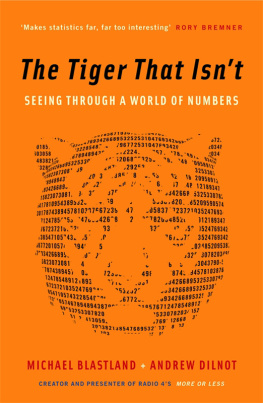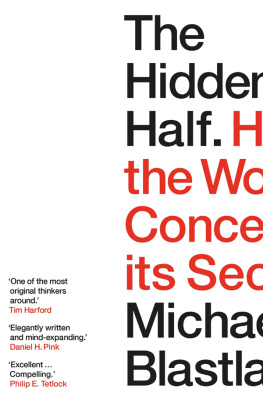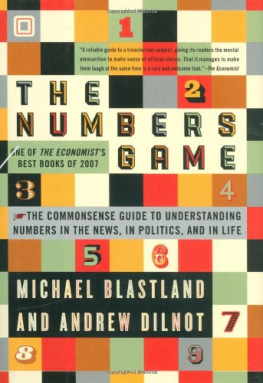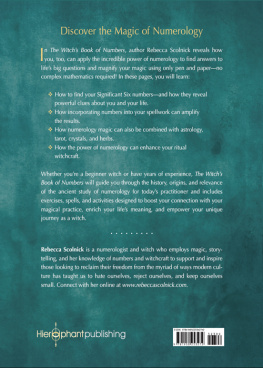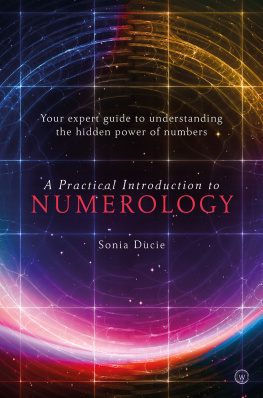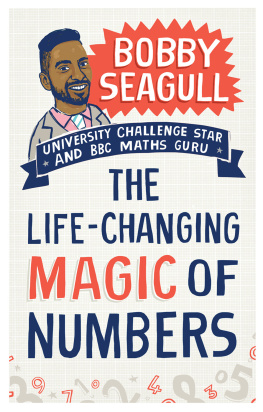
'Every journalist should get paid leave to read and reread The Tiger That Isn't until they've understood how they are being spun' New Scientist
'Personal and practical might even cause a social revolution' Independent
'This very elegant book constantly sparks Aha! moments as it interrogates the way numbers are handled and mishandled by politicians and the media' Steven Poole, Guardian
'A very funny book this is one of those maths books that claims to be self-help, and on the evidence presented here, we are in dire need of it' Daily Telegraph
'This delightful book should be compulsory reading for everyone responsible for presenting data and for everyone who consumes it' Sunday Telegraph
'Clear-eyed and concise' The Times
'A book about numbers and how to interpret them doesn't sound like interesting bedtime reading. Yet in the hands of Michael Blastland and Andrew Dilnot, that is what it becomes a reliable guide to a treacherous subject, giving its readers the mental ammunition to make sense of official claims. That it manages to make them laugh at the same time is a rare and welcome feat' Economist
'I have sat with Andrew Dilnot in many television studios and watched with awe as he eviscerates politicians who are trying to distort the figures to suit themselves. He is ruthless in exposing the lies that statistics can seem to support. This witty and fascinating book explains to us laymen how to make sense of numbers and how we can avoid having the wool pulled over our eyes. Invaluable' David Dimbleby
'A very fine book' Rod Liddle, Spectator
'With an appealing combination of dry wit and numerate common sense, the authors succeed in seeing off many tigers' Financial Times
'An eye-opening lightning tour through the daily use and abuse of killer facts: the way that statistics can beguile, distort and mislead This is essential reading for anyone interested in politics, economics or current affairs' Scotlandon Sunday
'Brilliant excursion into the way we misuse and misunderstand numbers and statistics, and how to see around it A great experience. Very readable, always informative and often entertaining, this is a book that every politician, civil servant and, well, everyone should read' popularscience.co.uk
'A book that is both illuminating and highly entertaining' Geoff Barton, Times Educational Supplement
'The arguments are fascinating and the examples accessible and relevant. Not only for mathematicians, but for everyone who reads the newspaper or watches the news. Journalists would be advised to read it closely and maths or stats teachers will find a wealth of real-life examples for direct use in the classroom' Plus, online maths magazine
'The Tiger That Isn't is that rarest of things: a compelling book about statistics. The book does a superb job at reminding us that numbers can only go so far in describing our very messy, very complicated, very human world' readysteadybook.com
'This book is a valiant attempt to encourage healthy scepticism about statistics, against a culture in which both news producers and consumers like extreme possibilities more than likely ones' New Statesman
'How to use the knowledge we already possess to understand numbers and make sense of the world around us' Mervyn King, Governor of the Bank of England
'If every politician and journalist were required to read this engaging and eye-opening book before embarking on their career, we would live in a wiser, better-governed world' Matthew Taylor, Chief Executive of the Royal Society of Arts, former chief advisor to the Prime Minister
'Illuminating and comprehensible to even the mathematically challenged' thefirstpost.co.uk
'Should be compulsory reading. It teaches critical thinking about numbers and what they mean in a hugely entertaining way' enlightenmenteconomics.com
MICHAEL BLASTLAND is a writer and broadcaster, and was the creator of More or Less and the author of Joe: The Only Boy inthe World, also published by Profile.
ANDREW DILNOT presented More or Less on BBC Radio 4. He is Principal of St Hugh's College, Oxford, and formerly the Director of the Institute for Fiscal Studies.
The Tiger That Isn't
Seeing Through a World of Numbers
MICHAEL BLASTLAND
&
ANDREW DILNOT

This expanded edition published in 2008
First published in Great Britain in 2007 by
PROFILE BOOKS LTD
3A Exmouth House
Pine Street
Exmouth Market
London EC1R 0JH
www.Profilebooks.com
Copyright Michael Blastland and Andrew Dilnot, 2007, 2008
10 9 8 7 6 5 4 3 2 1
Typeset in Palatino by MacGuru Ltd
info@macguru.org.uk
Printed and bound in Great Britain by
Bookmarque Ltd, Croydon, Surrey
The moral right of the authors has been asserted.
All rights reserved. Without limiting the rights under copyright reserved above, no part of this publication may be reproduced, stored or introduced into a retrieval system, or transmitted, in any form or by any means (electronic, mechanical, photocopying, recording or otherwise), without the prior written permission of both the copyright owner and the publisher of this book.
A CIP catalogue record for this book is available from the British Library.
eISBN 978-1-84668-111-0
To Catherine, Katey, Rosie,
Cait, Julia and Joe
This expanded and updated edition includes almost all the material from the original, together with a new chapter, numerous new examples (including a few to show that it is not only the UK that enjoys a culture rich in the murderous use of numbers), some new tricks, new arguments and old ones sharpened (we hope) by experience, and, finally, a quick checklist at the end. It also allows us an opportunity to make one new claim: that though the book is all about the way numbers are used, it is best thought of as being not about numbers at all, certainly not about numbers for their own sake. The kind of numbers we come across every day, the kind examined here, are always a means to an end; that end being a better understanding of life.
Michael B and Andrew D
April2008
Numbers saturate the news, politics, life. For good or ill, they aretoday's pre-eminent public language and those who speak it rule.Quick and cool, numbers often seem to have conquered fact.
But they are also hated, often for the same reasons. They canbamboozle not enlighten, terrorise not guide, and all too easily endup abused and distrusted.
Potent but shifty, the role of numbers is frighteningly ambiguous.How can we see our way through them?
First, relax
We all know more than we think we do. We have been beautifully conditioned to make sense of numbers, believe it or not, by our own experience. This is the radical premise of this book that readers have no need to throw up their hands in fear or contempt, if only they see how much they know already.
Numbers can make sense of a world otherwise too vast and intricate to get into proportion. They have their limitations, no doubt, but are sometimes, for some tasks, unbeatable. That is, if used properly.
So although there is a rich store of mischief and scandal here, it is not to discredit numbers themselves. There are lies and damned lies in statistics, for sure, but scorning numbers is no answer. For that is to give up the game on every political, economic or social argument you follow, every cause you love or hate.

